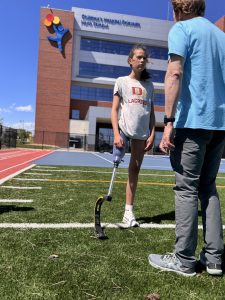Sexual assault case dismissed for Klaus Obermeyer Jr.

A United States District Judge on Sept. 5 dismissed a civil case alleging Klaus Obermeyer Jr., son of Aspen icon Klaus Obermeyer, sexually assaulted a woman in New York over two decades ago.
Judge John P. Cronan dismissed the case “with prejudice,” meaning it cannot be reopened.
The dismissal comes after the plaintiff, a woman from the Australian state of Tasmania, alleged that she was sexually assaulted by Obermeyer Jr. in New York City “around the end of 2002 or in or around the beginning of 2003,” according to a complaint filed in April 2025 to the Supreme Court of the State of New York, County of New York by the plaintiff’s lawyer, Albert J. Santoro of the New York-based The Bear Firm. The complaint was later moved to the U.S. District Court of the Southern District of New York.
The parties arrived at a dismissal after Obermeyer Jr.’s council, New York’s Jonathan D. Davis — who Sean “Diddy” Combs also hired during his series of sexual abuse cases — and Los Angeles lawyers Gregory P. Korn and Katherine T. Kleindienst filed on July 21 a notice of deposition to the plaintiff, directing her to describe the incident under oath on Sept. 19.
On Sept. 2, Santoro filed a motion to dismiss the lawsuit on behalf of the plaintiff.
“While the Plaintiff maintains the truth of her allegations, she desires to voluntarily dismiss the litigation with prejudice, put the events in her past, and move forward with her life,” the motion reads. “Defendant OBJECTS to this Motion.”
Santoro stated in the motion that he and Obermeyer Jr.’s counsel discussed the motion to dismiss in the days preceding the request but were unable to agree on the language contained in the motion.
On Sept. 4, Obermeyer Jr.’s lawyers granted the motion to dismiss, while specifying that the “action is ending before discovery is even underway.” Discovery occurs when the involved parties exchange evidence that they present in a trial or for settlement.
Obermeyer Jr.’s lawyers wrote in their response that the plaintiff’s motion to dismiss “offered her yet another opportunity to reiterate that she ‘maintains the truth of her allegations’ in the Complaint, even though she is dropping the lawsuit without receiving payment of a penny or any other benefit from Defendant Obermeyer.”
Judge Cronan granted the dismissal with prejudice on Sept. 5.
Details of the allegations
The complaint alleges that the plaintiff first met Obermeyer Jr., who is now 56, in an Aspen restaurant around 2001, where the plaintiff was a server and Obermeyer Jr. was a guest. It further alleges that the plaintiff was reintroduced to Obermeyer Jr. in New York City in 2002 or 2003.
It alleges that the plaintiff ingested a substance given to her by Obermeyer Jr. after the two allegedly attended a party together in New York City and that the plaintiff lost consciousness following ingestion of the substance. It alleges she woke up naked in a hotel room with symptoms consistent with intercourse and that two men were present in the room, one of whom was allegedly Obermeyer Jr.
According to a letter titled “Confidential Privileged Pre-Litigation Settlement Communication,” sent from the plaintiff’s lawyer, Santoro, to Obermeyer Jr. on Dec. 3, 2024, the plaintiff alleged that the other man in the room was an A-list actor and film producer.
Obermeyer Jr. told The Aspen Times this week that he had never met the accused actor and had not seen or spoken to the plaintiff since the fall of 1999.
Santoro told The Aspen Times this spring that there were at least five outcry witnesses who said they could confirm the plaintiff’s story. Over text last week, he told The Aspen Times, “that we didn’t get that far” in the lawsuit for the witnesses to testify. He said he couldn’t disclose their names.
Inconsistencies between documents
The confidential December 2024 letter and the April 2025 complaint follow different timelines and include various events when accusing Obermeyer Jr. of assault. The letter states that Obermeyer Jr. met the plaintiff “in or around 2000” in an Aspen restaurant, and that the A-list actor was present on the night of the allegations. In contrast, the complaint against Obermeyer Jr., filed four months later, does not mention the actor. The complaint also states that Obermeyer Jr. and the plaintiff first met in an Aspen restaurant a year later than the letter alleged.
Santoro told The Aspen Times last week that they never went on public record with the letter and that the plaintiff never took legal action against the actor.
A request for settlement before the lawsuit
The letter asked Obermeyer Jr. if he’d be willing to resolve the claims without a lawsuit.
“As an initial point, this letter is being sent in a good faith attempt to resolve this matter without filing a lawsuit to pursue these claims,” the letter states. “We would like the opportunity to discuss whether a resolution of this matter can be achieved without the necessity of filing a lawsuit. However, the window for filing (the plaintiff’s) claims closes on Feb. 28, 2025.”
New York City’s Gender-Motivated Violence Act, which enabled the plaintiff to sue, had a statute of limitations “look back” window deadline of Feb. 28. The act’s “look back” window enabled survivors of gender-based violence in the five bureaus of New York City to initiate civil suits against alleged perpetrators beyond nine years from the date of the alleged act, which is typically a set restraint.
Following the letter, Santoro asked that Obermeyer Jr. sign a Tolling Agreement, which requested the parties toll — or suspend — any statute of limitations deadline, such as the one set by the Gender-Motivated Violence Act, to “allow sufficient time for the Pre-Suit Discussion.”
Obermeyer Jr. said he denied the plaintiff’s Tolling Agreement, as well as the request to resolve the matter without a lawsuit.
Deadline extension for medical reasons
On Feb. 28, 2025, the day of the “look back” window filing deadline, Santoro filed a Summons with Notice on behalf of the plaintiff to Obermeyer Jr.
The summons legally notified Obermeyer Jr. of the lawsuit and alleged his sexual assault of the plaintiff. It stated the plaintiff would seek “money damages” exceeding $75,000.
Complaint Answer
In the complaint answer, filed on July 21, Obermeyer Jr. denied the allegations relating to the sexual assault.
Obermeyer Jr. denied that the plaintiff was reintroduced to him by a mutual friend in New York City “in or around the end of 2002 or in or around the beginning of 2003,” except “admits that Obermeyer was introduced to (the plaintiff) decades ago.”
He denied the allegations that he went to a party with the plaintiff in New York at that time but “admits socializing with (the plaintiff) decades ago.” The document asserted that “any physical contact or touching between (the plaintiff) and Obermeyer at any time was consensual.”
It also noted that the plaintiff “fell asleep at some point after socializing with Obermeyer.” It denied that the plaintiff lost consciousness following ingestion of a substance.
Criminal history of plaintiff’s counsel
Santoro, the plaintiff’s attorney, was sentenced to 18 months in prison after he pleaded guilty in 2006 to operating an unlicensed money transmitting business and surrendered his law license as a special condition of the conviction, according to a document filed to the Appellate Division of the Supreme Court of New York County. His name was stricken from the roll of attorneys in New York State on Sept. 4, 2007.
On June 15, 2023, 15 years after his name was removed from the New York State roll of attorneys, Santoro was reinstated to the New York State Bar.
Skyler Stark-Ragsdale can be reached at 970-429-9152 or email him at sstark-ragsdale@aspentimes.com.
Sexual assault case dismissed for Klaus Obermeyer Jr.
A United States District Judge on Sept. 5 dismissed a case alleging Klaus Obermeyer Jr., son of Aspen icon Klaus Obermeyer, sexually assaulted a woman in New York over two decades ago.










